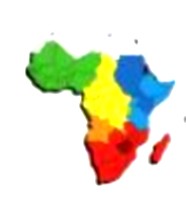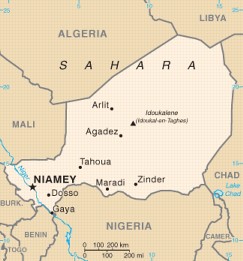Africa : Niger : Heading off mass starvation in Niger, aid agencies rolling, UN dickering & ducking; but Bush broadly backs UN
The situation in Niger has been politicized; we expect this phenomenon these days. Word comes anyway that aid agencies are up and running to save an estimated 800,000 children under 5 years of age, who are especially vulnerable in the wake of the destruction of the harvest this year by locausts and drought. There is fear as well that the conditions will spread to neighbouring countries of Black Africa.
Regions of Black Africa
Meera Selva and Anne Penketh reported today in The Independent, London, UK, "Aid agencies race to feed Niger's starving children," July 27, 2005 (click the headline above to view the entirety of this important article).Toby Porter, the director of emergencies for Save The Children, said: "It's not a famine. These kids are starving to death because they are poor." He said the "hidden emergency" had been caused by the chain of events occurring in one of the world's most impoverished countries. The lack of rain, followed by poor harvest and a steep rise in the price of millet had pushed more than one third of the population over the edge. ¶ Mr Porter said: "The Make Poverty History campaign said a child in Africa dies every three seconds. This is what it looks like." ¶ The UN put out urgent appeals to raise funds for 2.5 million people in Niger 10 months ago but received no money until children began starving to death. ¶ But while aid agencies and governments have rushed food to Niger, its neighbouring countries are still in need of help. The UN is warning that the food shortages will spread to other countries in the Sahel desert, such as Mali, Burkina Faso and Mauritania.
What the UN is at last acknowledging is that it has never bothered to establish a Reserve Fund to fill the time-gap between the emergence of a starvation-potential crisis which its experts can detect earlier than the media and the public can absorbe the idea, and the mobilization of the latter into the gift-giving and allocation mode. according to a July 20 press statement from the WorldBank Media Centre.Niger's severe food crisis could have been prevented if the United Nations had a reserve fund to jump-start humanitarian aid while appeals for money were considered, Reuters reports a senior UN official said on Tuesday.
The UN Office for the Coordination of Humanitarian Affairs, known as OCHA, has $50,000 to quickly respond to emergencies, but only for loans, which must be repaid. Instead, it wants $500,000 for grants to rapidly launch emergency relief campaigns as soon as warning signs emerge, Jan Egeland, the head of OCHA, told a group of reporters. "We need a central emergency fund so that we can have some predictability," Egeland said. "As of now we have none."
An appeal by the Food and Agricultural Organization for $4 million brought in $650,000, all of it from Sweden. UN agencies have appealed for $30 million in humanitarian aid, and about $10 million of that has come in so far. Had the world responded immediately, it would have cost $1 a day to prevent malnutrition among children. Now it costs some $80 to save a malnourished child's life, Egeland said. The combined annual UN appeal for humanitarian aid, typically about $3.5 billion a year, "is one-third of what Europeans eat in ice cream a year, and it is one-tenth of what Americans spend on their pets a year," he said. Xinhua and Norwegian Broadcasting (NRK) further reports the Norwegian government has granted an extra 15 million Norwegian Kroners ($2.25 million) in emergency aid to victims of the famine in Niger.
Bush broadly backs UN against Congress' naysayers; says UN reforms are coming
Barry Schweid of the Associated Press via Yahoo!News, reported already on July 21, 2005 that theWhite House Opposes Bill to Cut UN Funds. The President believes support for the UN is the path to its reform. I propose that the need for a UN Humanitarian Crisis Reserve Fund should constitute one of the absolutely necessary UN reforms, but that its usage be strictly llimited by explicit criteria well established in advance. Further, the administration and outlay of the funds of a UNHC Reserve Fund should be carefully monitored so as not to repeat the kind of fiasco that occured with the Oil-for-Food program that facilitated greedy UN personnel and contractors creaming off the top, in cahoots with Saddam Hussein. - Politicarp


No comments:
Post a Comment